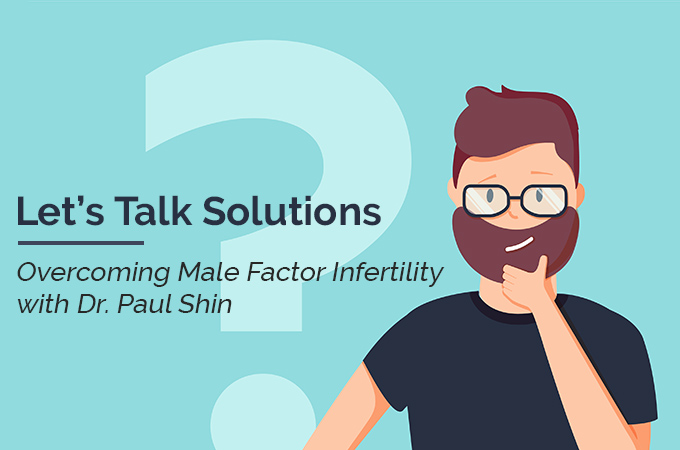“Should I be having sex every day?” “Can alcohol impact sperm health?” “Does a healthy diet increase your chances of conceiving?” Men have questions and we have the answers. The Beat Infertility Podcast turned to SGF Reproductive Urologist, Dr. Paul Shin, to shed light on how to help overcome male factor infertility through lifestyle changes.
Host: Let’s discuss some solutions to male factor infertility with lifestyle changes. Should men avoid hormone disruptors like BPA?
Dr. Shin: “The specific concern with BPA is that it’s in a lot of plastics, and plastics are in everything we come into contact with. BPA is estrogenic, meaning it has higher levels of estrogen, which we know can be detrimental to male fertility. That being said, it’s nearly impossible to avoid plastics in our day to day life. The push behind being ‘BPA free’ is to limit your exposure to these estrogen-like compounds, particularly the ones that you ingest in the food service industry.”
Host: How important is the timing of sexual activity? Should couples have sex every day during their fertile window or wait every other day?
Dr. Shin: “With regard to sexual activity, I think a little bit of that is contingent on what the overall sperm count is for a man. If a man has a reasonable sperm count at about 20-30 million motile sperm or above, I don’t see any reason why that couple can’t have intercourse every day during the fertile window. But for men who have lower sperm counts, there is some credence to waiting every other day in an effort to ‘build up’ sperm for ejaculation.”
Host: Should men be avoiding tobacco, steroids, and recreational drugs?
Dr. Shin: “The general advice I give to people is whatever would make sense to you in terms of a healthy lifestyle choice is going to make sense in regard to your fertility. Tobacco has a ton of free radicals and other chemicals that we know play a role in sperm production and can negatively affect your sperm count. Having a cigar on the weekend will probably not make a difference, but if you’re a two-pack-a-day smoker, you can expect this to put a burden on your health and fertility.”
“Marijuana is the same way. We know that chronic marijuana smokers have lower rates of motility, lower sperm counts, and can have disruptions on the hormone axis. Steroids are a huge ‘no,’ and this is a mistake that I, as a reproductive urologist, see a couple of times a week. Young men of childbearing age put on testosterone without any counseling, which can negatively impact sperm counts. Testosterone in any form whether its gel you put on your skin or pellets you implant, all work negatively to drive down your levels of sperm production.”
Host: Does alcohol influence a man’s infertility?
Dr. Shin: “This question, again, needs to be considered in the realm of common sense. There’s some medical literature that would argue that daily, very scaled back, moderate consumption has other health benefits, but if you are an alcoholic or have liver dysfunction then this assault on your overall health will prevent your body from devoting any energy to reproduction. I think that’s probably the most holistic way to think about it. A small amount of alcohol on a social basis is not going to make a big difference, but higher levels of consumption can not only impact your fertility but your overall health as well.”
Host: Many times, men hear about the importance of maintaining a healthy weight and eating right. What do you define this as, and what do you feel is a “healthy” diet?
Dr. Shin: “This can often be a controversial area in medicine because of people’s different frame sizes. BMI (body mass index) isn’t always the best indicator of a healthy weight and being overly focused on weight can be a gateway to other issues like eating disorders. A healthy weight for me is being able to do the things you want to do, like climbing stairs, exercising, and generally keeping a BMI under 25.”
“When it comes to defining a healthy diet, this is probably the number one question we get in regards to male fertility because diet and lifestyle habits are things within our control. Sometimes the infertility aspect is beyond your control. Eat at home more often than eating out and don’t make a habit of eating processed foods. There isn’t one magic food group to include or avoid. Eat a broad based diet with reasonable portions and try to minimize the amount of fast food you consume.”
Host: What are your thoughts on cycling and men’s sperm health?
Dr. Shin: “Cycling has been implicated in many negative things within the realm of urology, from prostate and urinary problems to sexual function issues. The main issue with riding a bike is that if your seat does not conform to your pelvis very well, you can get the compression of the nerve and artery that you need to maintain effective penile erections for intercourse. So the translation there is that you can have difficulty with sexual function. The best indicator that your bike seat doesn’t fit your pelvis correctly is if you get off your bicycle and you have numbness in the area behind your scrotum, within the scrotum itself, or in the penis.”
“Spending long amounts of time road cycling on the weekends really shouldn’t impact your fertility from a sperm making perspective. I think it’s more important to think of things from the sexual function aspect.”
Host: What are some positive ways to manage stress?
Dr. Shin: “When a couple goes through an infertility struggle, that is arguably the first major marital test. There are a lot of different subtexts to how people manifest this stress. Men oftentimes feel inadequate if they can’t get pregnant with their partner. Stress management is a critical part of that, whether it’s through counseling or exercise or just taking time for yourself to do the things you like to do. You need that anchor to take care of yourself. While it’s not physically a big deal, mentally and emotionally infertility and the stress associated with it can be devastating.”
Host: When it comes to medication, when is clomid recommended and how does it work?
Dr. Shin: “Clomid is probably the medication I use the most. It works in the pituitary gland to increase levels of LH (luteinizing hormone) and FSH (follicle-stimulating hormone), therefore driving downstream the better production of sperm and testosterone. It’s a tablet, not an injection that tends to work pretty well for most men. Indications for using clomid are either low levels of testosterone or low sperm count combined with a very low level of FSH as well. If you’re looking to boost either one of those hormones, clomid is a rather effective and cheap way to do it.”
Dr. Shin sees patients in our K Street, Woodbridge, Frederick and Fair Oaks offices. To learn more or to schedule an appointment with Dr. Shin or any other SGF physician, please contact the New Patient Center at 1-877-971-7755 or complete our brief online form.






